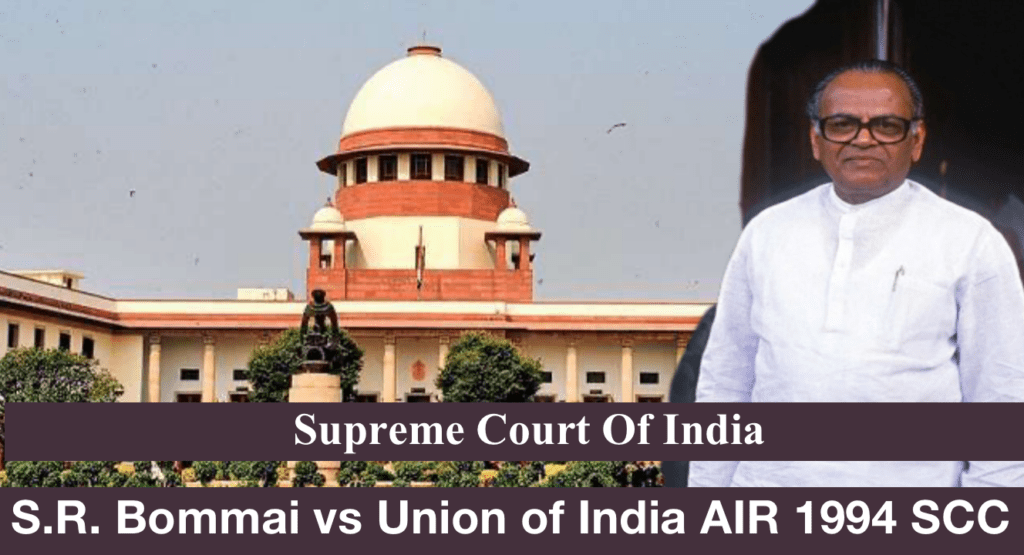
| Citation | AIR 1994 SCC |
| Date of judgment | 11/03/1994 |
| Court | Supreme Court |
| Case type | Constitutional Petition |
| Appellant | S.R. Bommai |
| Respondent | Union of India |
| Bench | Hon’ble Justice S.R.Pandian, A.M.Ahmadi Kuldip Singh, J.S. Verma, P.B. Sawant, K. Ramaswamy, S.C Agarwal, Yogeshwar Dayal , B.P.Jeevan Reddy. |
| Referred | Article 356, 13,74, 355 Indian constitution |
FACTS OF THE CASE
- S.R. Bommai was the chief minister of the Janata Dal government in Karnataka between 13 August 1988 and 21st April 1989.
- His government was dismissed on 21 April 1989 under Article 356 of the constitution and president’s rule was imposed in what was then a party mostly mode to keep opposition party at bay.
- The dismissal was on grounds that the government had lost majority following large scale defections engineered by several party leaders of the day.
- Then governor p Venkatasubbaiah refused to give an opportunity to test his majority in the assembly despite the letter presenting him with a copy of the resolution passed by the Janata Dal legislative party.
- On dec. 15, 1992, President Rule was imposed in three States of Madhya Pradesh, Himachal Pradesh and Rajasthan and Assemblies were dissolved on the ground that these States were not implementing sincerely the ban imposed by centre on religious organisation.
- The main grounds on which the government had been dismissed were that the chief ministers of these states had connections with an organisation which had been banned, and secondly, that these governments had encouraged the Kar Sevaks to go to Ayodhya.
- Thus, the basis was mere suspicion that they would refuse to enforce the ban. There were no proof that they were not following the directions of the centre.
- The three government had submitted more or less identical report in 24 hours. This was clear abuse of Art. 356 where duly elected government were dismissed merely on the ground of suspicions.
ISSUES:
- whether Article 356(1) of the Constitution gives the President unrestricted authority to issue proclamations was raised.
- Whether the proclamation comes under the scope of Judicial Review under Article 13?
Appellant: –The appellant alleged that the Supreme court have a power to judicial review under Article 13 of Indian constitution in related to proclamation of president rule by the president appellant also challenged the judgement of High Court.
Respondent: The respondent, argued that the President would issue the Proclamation under Article 356 [1] based on the guidance of the Council of Ministers provided under Article 74(1) of the Constitution. Because Clause [2] of the same Article prohibits investigation into whether any and, if so, what advice was offered to the President, judicial supervision of the factors that contributed to the issuance of a Proclamation is also barred,
JUDGMENT: –
In this case court laid down the following guidelines:
- Presidential proclamation dissolving a State Legislative Assembly is subject to judicial review.
- If a State Government works against secularism, Presidents Rule can be imposed.
- There can be no wholesale dismissal of opposition ruled states governments when a new political party assumes power at the Centre.
- Imposition of Presidents Rule and dissolution of State Assembly cannot be done together.
- State Assembly can be dissolved only after parliament approves Central Rula.
- The Supreme Court or a Hogh Court can compel the Union Government to disclose material on whose basis Presidents Rula imposed on a State.
- The power of the President under Art. 356 is a constitutional power, it is not an absolute power. The existence of material is a pre-condition to form the satisfaction to impose the President’s Rule.
Conclusion: –
This case deals with assessing the lawful mechanism and searching the whole area of constitution imperative on Central state relations and the contentions’ role of State governors calling president rule. the fact under the system of our constitution great power is discussed upon the centre vis-a- vis the state does not mean that the states are little appendices of the centre. the centre cannot temper with their empowers. The decision is acknowledged to be an important judgment as it has put and into the arbitrary explain its position of state government under article 356 has to function the judgement reason that the power of the president is not absolute but a custom power and the presidential proclamation is not excluded from the judicial analysis
Reference: –
Constitutional law of India by Dr. J.N Pandey
This Article written by Aarti Goyal of Sardar Patel Subharti Institute of Law, intern at Legal Vidhiya.




0 Comments